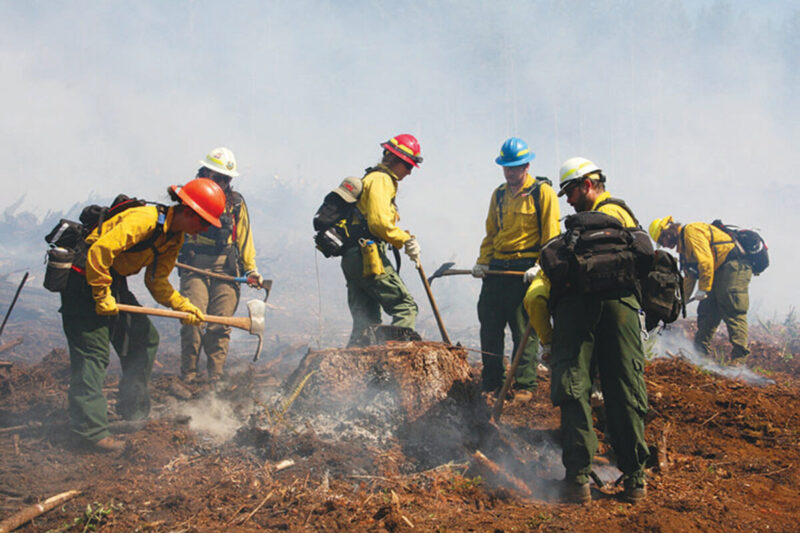Benny Westcott
That plume of smoke rising over Foster Lake Friday morning, June 30, was a good thing.
The five-day Mid-Willamette Valley Interagency Wildland Fire School returned to Sweet Home last week for the first time since 2019, following a COVID pandemic-induced hiatus.
The training program public and private agencies culminated with a live fire exercise Friday on Marks Ridge, just outside of Sweet Home. More than 200 wildland firefighters and instructors participated.
The live fire was a controlled burn of slash piles created by forest management activities. It presented trainees with a final challenge for the week: applying their newly acquired skills and technique, learned in classroom settings, to suppress and mop up a real fire.
“Cascade Timber Consulting, a local forest landowner, provides a new field site each year and we are very grateful,” said Fire School Co-Incident Commander Craig Pettinger, of the Sweet Home Oregon Department of Forestry unit.
“The live fire exercise provides an invaluable training experience – working in smoke, hiking through uneven terrain, and working closely with crew members to dig fireline – these are all things they’ll experience this season as wildland firefighters.”
This year, the field site used for the live fire was located north of Foster Lake, approximately two miles northeast of Sweet Home.
Firefighters included employees of the ODF, U.S. Forest Service, Bureau of Land Management, U.S. Fish and Wildlife Service, private companies like Weyerhaeuser and Starker Forests, and local rural fire district members. People came from regions spanning from Oregon’s coast to the Cascades to participate. The training was geared toward first time firefighters and those with minimal experience to allow them to get tangible experience fighting fire in a wildland setting.
“We’ve been in fire school all week with a lot of classroom and a little bit of field time, and today they get to put all the pieces together of everything they’ve learned,” Pettinger said during the live fire. “We’ve got live fire on the ground, and the goal that I gave them for the end of the day is no heat and no smoke when everybody goes home.”
Once the firefighters get through the training, they’re ready for the real thing. “Essentially they’re certified and trained after this exercise today,” Pettinger said. “They could end up on a fire tomorrow.”
He added that “It’s a curriculum that we’ve built and it’s nationally recognized. That’s the training firefighters have to go through.”
He said the live fire is the most important part of the week. “To me, this is the most important, but they need to learn about it before they do it,” he said. “We wouldn’t want this to be the first thing in the week. It’d be chaos.”
He spoke of protecting the area. “Everything out here has a value,” he said. “These trees are valuable, and there’s valuable habitat for wildlife. That’s important and we want to protect that.
“But then it comes down to how people are building homes in the wildland urban interface, and that’s a pretty valuable resource as well,” he continued.
To folks living in that area, he said “The best thing they can do is make sure we can get into their place and they have a structure that’s defensible.”
His advice is particularly timely. “Fire season is upon us,” he said. “We wish it wasn’t yet, but it’s warm and dry and it’s going to get a lot warmer and drier this next week. It’s extremely important that [firefighters] know the actual job. Once you’ve actually done it, I think it sticks with you.”
He said that Cascade Timber Consulting is a partner in fighting fire as well. “As a land owner, they have that responsibility,” he noted.
Pettinger has been involved with the fire school for 23 years and still enjoys it.
“I like seeing the new folks get excited about it,” he said. “Some of them might not carry on with this as a career, but after the fire school you just see the smiling faces and they kind of get hooked.”
He said that “We have to keep recruiting folks into this, because people get older, they retire, they move on,” he said. “But this job is not going to go away. Fires are not going to quit happening.”
He said the Sweet Home community is happy to have the school there. “COVID was the big thing that kept us from doing it,” he said. “We did some training at other facilities, but it didn’t include live fire. So we just didn’t feel good about it.
“When we started this week after not having done it for a couple years, it just felt right, seeing everybody show up to the school, and then knowing that we were going to have this live fire,” he said. “It just feels like we’re giving the students a complete package.”
Adaptations were made by CTC in how the area was prepared
“We were able to have them pile [materials] a little bit differently for the fire school – a little bit smaller piles that we can easily take care of,” he said.
While the event is just a training, the crew is still coping with a real fire, of course, which must be taken seriously. “There’s always a risk involved in it,” Pettinger said.
“We had the conversation all week on whether we were going to do live fire or not, because it is getting warm and dry. We made the decision this morning to light one pile, and we just kind of watched it for 20 minutes to see what it was going to do, and it didn’t spread, so we were like let’s give the students what they really want. Let’s give them some fire.”
One of those students is Sabrina Giulietti. An intern for Starker Forests this summer in between her studies at Oregon State University, she is one of six other Starker interns who went to fire school in order to prepare themselves in case there is ever a fire on the property.
“I’m just excited to be here and learn more about firefighting,” she said. “It takes a lot of work and grit. So I know I have a lot of respect for firefighters. Especially digging a hand line, it’s a lot of work, just knowing how to keep a pace and stamina.
“I’ve also learned how dangerous firefighting is, and how important it is to have situational awareness and to be aware of your surroundings and looking out for everybody that you’re working with,” she continued.
Giulietti noted that fire can spread fast in wildland settings. “When there’s a crown fire, it can go super quick.”
She said “I think getting this hands on training before you go out with an actual crew is really important, because you realize the importance of teamwork, and the different techniques with the tools.”
She noted that “I had never worked with fire at all before, and now I feel like I’ve gotten a ton of experience in the classroom and learned a ton from my instructors.”
Safety comes first. “We are all trying to put out fires here, but the most important thing is safety, and that everybody comes home,” she said. “So that’s what we will make a priority.”
Springfield based ODF firefighter Connor Reardon said the live fire is “a good opportunity for a lot of new firefighters and more seasoned firefighters to train.
“You have a lot of things that can burn in the forest,” he said. “The fires that you see out in the forest are larger scale than the fires you see in town. If those large scale fires aren’t stopped and controlled, it could pose a threat to small and large communities alike.”
He added that “Trainings like these are so crucial so firefighters can stop fires early on, so they don’t become one of those incidents that the public sees in the news.”
He noted that “Fire season is a very short window in Oregon, but it’s getting longer in recent years. The trainings are really important because there is a short turnaround for new seasonals to come on and refresh their skills and knowledge of wildland firefighting. The endeavors to train people to know how to fight fire early on is extremely important to prepare to fight those fires during the summer.”
He was happy to see fire school back in action. “Although this is the first live fire training exercise and fire school we’ve had in recent years, all agencies have put in tremendous amounts of work to train their firefighters to fight wildland in the summers,” he said. “And I think having fire school for the first time in a while has just been a bigger benefit and asset to this upcoming season and the seasons to come.”
But the important work doesn’t stop with firefighters.
“Coming up into the middle of the summer, it’s important for people to be aware of the changing conditions and weather, and the serious potential of wildland fire,” Reardon said. “Being aware of those things makes firefighters’ jobs a lot easier.”





